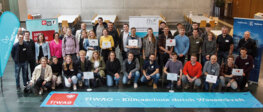Im Rahmen der Erasmus Woche an der Thomas More University of Applied Sciences in Belgien hatte ein Lehrender der FH Kufstein Tirol Gelegenheit, an den International Days der größten Partnerhochschule für angewandte Wissenschaften in Flandern teilzunehmen.
Levels of the qualifications awarded
The levels of the qualifications awarded at the FH Kufstein are based on the Dublin Descriptors. These descriptors, which are not field specific and are thus applicable to all degree programs, outline the capability profile of graduates with a bachelor, master or doctoral degree. This framework was developed at the European level by the Joint Quality Initiative workgroup.
1. In accordance with the Dublin Descriptors, a bachelor degree (First Level) is awarded to students who:
- have demonstrated knowledge and understanding in a field of study that builds upon their general secondary education, and is typically at a level that, whilst supported by advanced textbooks, includes some aspects that will be informed by knowledge of the forefront of their field of study;
- can apply their knowledge and understanding in a manner that indicates a professional approach to their work or vocation, and have competences typically demonstrated through devising and sustaining arguments and solving problems within their field of study;
- have the ability to gather and interpret relevant data (usually within their field of study) to inform judgments that include reflection on relevant social, scientific or ethical issues;
- can communicate information, ideas, problems and solutions to both specialist and non-specialist audiences;
- have developed those learning skills that are necessary for them to continue to undertake further study with a high degree of autonomy.
The bachelor degree programs at the FH Kufstein therefore aim to do the following:
- convey to students relevant expert knowledge in the scientific disciplines related to the field of study as well as cultivate their methodological and analytical skills so that they will have the capacity to evaluate and argue for relationships on both a subject and interdisciplinary level;
- offer students a range of specializations as compulsory electives within the framework of the curriculum;
- support students in acquiring professional and interdisciplinary competencies such as: the ability to independently and self-responsibly solve problems and make decisions; the ability to filter, consolidate and structure knowledge and information; the ability to continue learning independently and at their own initiative;
- require students to participate in an integrated professional internship lasting 6 to 15 weeks;
- require students to independently compose 2 research papers in the coursework of the curriculum (Bachelor Thesis I and II), by means of which students demonstrate their ability to work on a problem in their field of study by calling on scientific methods, all within a fixed time frame.
2. In accordance with the Dublin Descriptors, a master degree (Second Level) is awarded to students who:
- have demonstrated knowledge and understanding that is founded upon and extends and/or enhances that which is typically associated with bachelor’s level, and that which provides a basis or opportunity for originality in developing and/or applying ideas, often within a research context;
- can apply their knowledge and understanding as well as problem solving abilities in new or unfamiliar environments within broader (or multidisciplinary) contexts related to their field of study;
- have the ability to integrate knowledge and handle complexity, and formulate judgments with incomplete or limited information, but that include reflecting on social and ethical responsibilities linked to the application of their knowledge and judgments;
- can communicate their conclusions, and the knowledge and rationale underpinning these, to specialist and non-specialist audiences clearly and unambiguously;
- have the learning skills to allow them to continue to study in a manner that may be largely self-directed or autonomous.
The master degree programs at the FH Kufstein therefore aim to do the following:
// offer students a logical continuation for their completed bachelor degree, with an emphasis on the consolidation or specialization (type “Genuine”) or the extension (type “Hybrid”) of their existing competencies/qualifications;
// convey to students relevant expert knowledge in the scientific disciplines related to the field of study as well as cultivate their methodological and analytical skills in such a way that students may enhance their capacity to evaluate and argue for relationships on both a subject and interdisciplinary level;
// convey sophisticated scientific and methodological approaches (more complex than those taught at the bachelor level);
// encourage students to develop professional and academic interdisciplinary competencies, such as:
- the ability to independently expand on acquired knowledge and understanding and apply it to new or unfamiliar situations;
- the ability to draw on and confidently deal with the acquired knowledge such that clear and logical arguments in favor of or against ideas, solutions, etc. can be formulated for an audience made up of experts or laypersons;
- the ability to act self-responsibly in professional environments and in equal cooperation with decision makers from outside the field of expertise;
- the ability to continuously and independently improve on one’s processes for conceiving, planning, and carrying out solutions to field-related problems;
- the ability to continue learning through rigorous scientific research work and to write up the results in professional papers, as demonstrated by the composition of the master’s thesis.
3. In accordance with the Dublin Descriptors, a doctoral degree (Third Level) is awarded to students who:
have demonstrated a systematic understanding of a field of study and mastery of the skills and methods of research associated with that field; have demonstrated the ability to conceive, design, implement and adapt a substantial process of research with scholarly integrity; have made a contribution through original research that extends the frontier of knowledge by developing a substantial body of work, some of which merits national or international refereed publication; are capable of critical analysis, evaluation and synthesis of new and complex ideas; can communicate with their peers, the larger scholarly community and with society in general about their areas of expertise; can be expected to be able to promote, within academic and professional contexts, technological, social or cultural advancement in a knowledge based society.



